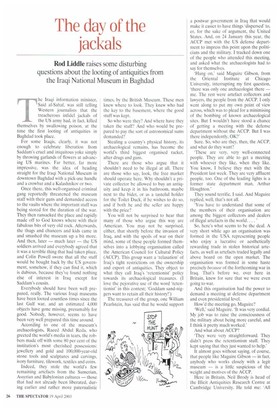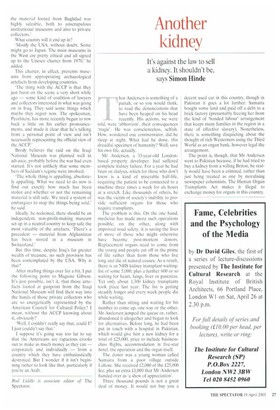The day of the jackals
Rod Liddle raises some disturbing questions about the looting of antiquities from the Iraqi National Museum in Baghdad The Iraqi information minister, Said al-Sahaf, was still telling Western journalists that the treacherous infidel jackals of the US army had, in fact, killed themselves by swallowing poison, at the time the first looting of antiquities in Baghdad took place.
For some Iraqis, clearly, it was not enough to celebrate liberation from Saddam's cruel and iniquitous yoke simply by throwing garlands of flowers at advancing US marines. Far better, far more impressive, was the idea of heading straight for the Iraqi National Museum in downtown Baghdad with a pick-axe handle and a crowbar and a Kalashnikov or two.
Once there, this well-organised criminal gang reportedly threatened the museum staff with their guns and demanded access to the vaults where the important stuff was being stored for the duration of the war. They then ransacked the place and rapidly made off to God knows where with their fabulous bits of very old rock. Afterwards, the thugs and chancers and kids came in and smashed the museum up a bit more. And then, later — much later — the US soldiers arrived and everybody agreed that it was a terrible thing that had taken place, and Colin Powell swore that all the stuff would be bought back by the US government, somehow, if they can find it, which is dubious, because they've found nothing else of interest in Iraq except for Saddam's cousin.
Everybody should have been well prepared, really. The various Iraqi museums have been looted countless times since the last Gulf war, and an estimated 4,000 objects have gone missing, presumably for good. Nobody, however, seems to have been very well prepared this time around.
According to one of the museum's archaeologists, Raced Abdul Reda, who greeted the world's media in tears, the robbers made off with some 80 per cent of the institution's most cherished possessions: jewellery and gold and 100,000-year-old stone tools and sculptures and carvings, ivory furniture, tilework, textiles and coins.
Indeed, they stole the world's few remaining artefacts from the Sumerian, Assyrian and Babylonian cultures — those that had not already been liberated, during earlier and rather more paternalistic times, by the British Museum. These men knew where to look. They knew who had the key to the basement, where the good stuff was kept.
So who were they? And where have they taken the stuff? And who would be prepared to pay the sort of astronomical sums demanded?
Stealing a country's physical history, its archaeological remains, has become the world's third biggest organised racket, after drugs and guns.
There are those who argue that it shouldn't need to be illegal at all. There are those who say, look, the free market should operate here. Why shouldn't a private collector be allowed to buy an antiquity and keep it in his bathroom, maybe next to the bidet, or as a tasteful holder for the Toilet Duck, if he wishes to do so, and if both he and the seller are happy with the price?
You will not be surprised to hear that many of those who argue this way are American. You may not be surprised, either, that shortly before the invasion of Iraq, and with the spoils of war on their mind, some of these people formed themselves into a lobbying organisation called the American Council for Cultural Policy (ACCP). This group want a 'relaxation' of Iraq's tight restrictions on the ownership and export of antiquities. They object to what they call Iraq's `retentionist' policy towards its archaeological treasures. (I love the pejorative use of the word `retentionise in this context; 'Goddam sand-niggers want to retain all their history!') The treasurer of the group, one William Pearlstein, has said that he would support a postwar government in Iraq that would make it easier to have things 'dispersed' to, er, for the sake of argument, the United States, And, on 24 January this year, the ACCP met with the US defense department to impress this point upon the politicians and the military. I tracked down one of the people who attended this meeting, and asked what the archaeologists had to say for themselves.
'Hang on,' said Maguire Gibson, from the Oriental Institute at Chicago University, interrupting my first question, 'there was only one archaeologist there — me. The rest were artefact collectors and lawyers, the people from the ACCP. I only went along to put my own point of view across, which was to plead for a minimising of the bombing of known archaeological sites. But I wouldn't have stood a chance of getting a meeting with the defense department without the ACCP. But I was there independently, OK?'
Sure. So, who are they, then, the ACCP, and what do they want?
'These are very, very well-connected people. They are able to get a meeting with whoever they like, when they like. You know, I believe they met with the President last week. They are very affluent people, too. One of the leading lights is a former state department man, Arthur Houghton.'
They sound terrific, I said. And Maguire replied, well, that's not all.
'You have to understand that some of the members of their organisation are among the biggest collectors and dealers of illegal artefacts in the world. .
So, here's what seems to be the deal. A very short while ago an organisation was formed in the USA representing people who enjoy a lucrative or aesthetically rewarding trade in stolen historical artefacts, as well as artefacts traded legally and above board on the open market. The organisation was formed in some haste precisely because of the forthcoming war in Iraq. That's before we, over here in Britain, knew for sure that we were even going to war.
And this organisation had the power to demand a meeting at defense department and even presidential level.
How'd the meeting go, Maguire?
'Well,' said Maguire. 'It was very cordial. My job was to raise the consciousness of the military about being more careful, and I think it pretty much worked.'
And what about ACCP?
'They were very straightforward. They didn't press the retentionism stuff. They kept saying that they just wanted to help.'
It almost goes without saying, of course, that people like Maguire Gibson — in fact, anybody who works closely with a legit museum — is a little suspicious of the weight and motives of the ACCP.
Here in Britain, Neil Brody is head of the Illicit Antiquities Research Centre at Cambridge University. He told me: 'All the material looted from Baghdad was highly saleable, both to unscrupulous institutional museums and also to private Collectors.'
What country will it end up in?
'Mostly the USA, without doubt. Some might go to Japan. The main museums in the West are pretty ethical and all signed up to the Unesco charter from 1970,' he added.
This charter, in effect, prevents museums from appropriating archaeological artefacts from developing countries.
The thing with the ACCP is that they just burst on the scene a very short while ago — some kind of coalition of lawyers and collectors interested in what was going on in Iraq. They said some things which maybe they regret now. The spokesman, Pearlstein, has more recently begun to row back a little on his earlier pronouncements, and made it clear that he's talking from a personal point of view and isn't necessarily representing the official view of the ACCP.'
Brody believes the raid on the Iraqi National Museum was planned well in advance, probably before the war had even started. It's not unlikely that some members of Saddam's regime were involved.
The whole thing is appalling, absolutely appalling. What we need to do now is find out exactly how much has been stolen and whether or not the remaining material is still safe. We need a system of embargoes to stop the things being sold,' he said.
Ideally, he reckoned, there should be an independent, non-profit-making museum set up in a neutral country to keep safe the most valuable of the artefacts. 'There's a precedent — material from Afghanistan has been stored in a museum in Switzerland.'
But this time, despite Iraq's far greater wealth of treasure, no such provision has been contemplated by the USA. Why is that?
After mulling things over for a bit, I put the following point to Maguire Gibson. It's just possible, isn't it, that those artefacts looted at gunpoint from the Iraqi National Museum will find their way into the hands of those private collectors who are so energetically represented by the American Council for Cultural Policy? I mean, without the ACCP knowing about it, obviously?
'Well. I couldn't really say that, could 1? I just couldn't say that.'
I suppose it's going way too far to say that the Americans are rapacious crooks out to make as much money as they can corporately and individually — from a country which they have enthusiastically destroyed. But I wonder if it isn't beginning rather to look like that, particularly if you're an Arab.
Rod Liddle is associate editor of The Spectator.



































































 Previous page
Previous page